This page contains brief biographical profiles of anti-war campaigners: individuals who wrote, spoke or agitated against World War I in some way. Click or tap links to open or close profiles. These profiles have been written by Alpha History authors.
[expand title=”Valentin Bulgakov (Russia)”]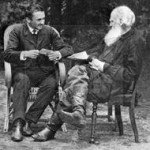 Valentin Bulgakov (1886-1966) was an associate and biographer of the famous Russian writer and philosopher Leo Tolstoy. Born in Penza, the young Bulgakov was an excellent student who showed a strong interest in literature and promise as a writer. He moved to Moscow for study but later quit to become Tolstoy’s secretary. After Tolstoy’s death in 1910 Bulgakov oversaw the old man’s legacy, publishing Tolstoy’s final works as well as his own articles and a popular biography. Because Tolstoy had a significant following, Bulgakov became a significant figure in Russian literature and political thought. When war erupted in 1914, Bulgakov condemned it as “the common enemy of us all”. Those who supported the war, he wrote, were “intoxicated” and overtaken by “the beast within us”. Bulgakov attempted to assemble an anti-war petition signed by prominent Tolstoyists but was tracked and arrested by the Okhrana, the Russian secret police. He was detained for more than a year but was later acquitted. Bulgakov later worked as a museum curator and sat on a committee organising food relief during the Soviet famine of 1921.
Valentin Bulgakov (1886-1966) was an associate and biographer of the famous Russian writer and philosopher Leo Tolstoy. Born in Penza, the young Bulgakov was an excellent student who showed a strong interest in literature and promise as a writer. He moved to Moscow for study but later quit to become Tolstoy’s secretary. After Tolstoy’s death in 1910 Bulgakov oversaw the old man’s legacy, publishing Tolstoy’s final works as well as his own articles and a popular biography. Because Tolstoy had a significant following, Bulgakov became a significant figure in Russian literature and political thought. When war erupted in 1914, Bulgakov condemned it as “the common enemy of us all”. Those who supported the war, he wrote, were “intoxicated” and overtaken by “the beast within us”. Bulgakov attempted to assemble an anti-war petition signed by prominent Tolstoyists but was tracked and arrested by the Okhrana, the Russian secret police. He was detained for more than a year but was later acquitted. Bulgakov later worked as a museum curator and sat on a committee organising food relief during the Soviet famine of 1921.
[/expand]
[expand title=”Eugene Debs (USA)”]
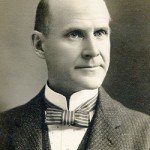 Eugene Debs (1855-1926) was an American socialist, labour organiser and political candidate. Born in Indiana, the teenage Debs obtained employment for the railways and became involved in trade unions. By the 1890s he was one of the nation’s most influential labour leaders, helping form unions and playing a key role the Pullman strike against massive wage cuts. Debs was thrown into prison, where he embraced socialism and became a cause célèbre for American unionists. On his release Debs founded and led both the Social Democratic Party of the United States (1896) and, in 1905, the Industrial Workers of the World, better known as the IWW or ‘Wobblies’. Debs was a charismatic and captivating public speaker. He ran against Woodrow Wilson in the 1912 presidential election, winning almost a million votes despite not belonging to a major party. Debs was pacifist and anti-war: he condemned the conflict in Europe as an act of exploitation of the working class. In June 1918 Debs delivered a speech in Ohio and called on American workers to resist conscription and military service. This proved the last straw for the government, which arrested Debs under the Sedition Act and sentenced him to ten years in prison. He was released after serving a quarter of that and was later given a presidential pardon.
Eugene Debs (1855-1926) was an American socialist, labour organiser and political candidate. Born in Indiana, the teenage Debs obtained employment for the railways and became involved in trade unions. By the 1890s he was one of the nation’s most influential labour leaders, helping form unions and playing a key role the Pullman strike against massive wage cuts. Debs was thrown into prison, where he embraced socialism and became a cause célèbre for American unionists. On his release Debs founded and led both the Social Democratic Party of the United States (1896) and, in 1905, the Industrial Workers of the World, better known as the IWW or ‘Wobblies’. Debs was a charismatic and captivating public speaker. He ran against Woodrow Wilson in the 1912 presidential election, winning almost a million votes despite not belonging to a major party. Debs was pacifist and anti-war: he condemned the conflict in Europe as an act of exploitation of the working class. In June 1918 Debs delivered a speech in Ohio and called on American workers to resist conscription and military service. This proved the last straw for the government, which arrested Debs under the Sedition Act and sentenced him to ten years in prison. He was released after serving a quarter of that and was later given a presidential pardon.
[/expand]
[expand title=”Albert Einstein (Germany/Switzerland)”]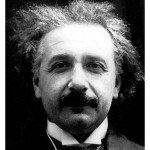 Albert Einstein (1879-1955) was a German-Swiss scientist and pacifist who opposed the war. Born in Germany to non-practising Jewish parents, Einstein’s family later moved to Italy and then Switzerland. In the early years of the 20th century Einstein worked as a patent clerk in Bern, before commencing studies and completing a PhD in molecular studies. Einstein went on to lecture at universities in Prague and Zurich and was considered one of Europe’s leading scientists. In mid 1914 he returned to Germany to head the Kaiser Wilhelm Institute for Physics. The outbreak of World War I caught Einstein by surprise, however he remained in Germany for the duration of the war. Though most of his time was taken up with science and research, Einstein often expressed opposition for the war and contempt for those who perpetuated it. He joined three other scientists in drafting a manifesto that condemned the war and the errors that had allowed it to unfold. Einstein also penned several editorials and letters condemning the wastefulness and needless destruction of the war – however he was not yet a household name, so his opposition was barely noticed. Einstein’s theory of relativity, developed immediately after the war, catapulted him to fame, and he is now regarded as probably the most famous physicist in history.
Albert Einstein (1879-1955) was a German-Swiss scientist and pacifist who opposed the war. Born in Germany to non-practising Jewish parents, Einstein’s family later moved to Italy and then Switzerland. In the early years of the 20th century Einstein worked as a patent clerk in Bern, before commencing studies and completing a PhD in molecular studies. Einstein went on to lecture at universities in Prague and Zurich and was considered one of Europe’s leading scientists. In mid 1914 he returned to Germany to head the Kaiser Wilhelm Institute for Physics. The outbreak of World War I caught Einstein by surprise, however he remained in Germany for the duration of the war. Though most of his time was taken up with science and research, Einstein often expressed opposition for the war and contempt for those who perpetuated it. He joined three other scientists in drafting a manifesto that condemned the war and the errors that had allowed it to unfold. Einstein also penned several editorials and letters condemning the wastefulness and needless destruction of the war – however he was not yet a household name, so his opposition was barely noticed. Einstein’s theory of relativity, developed immediately after the war, catapulted him to fame, and he is now regarded as probably the most famous physicist in history.
[/expand]
[expand title=”Emma Goldman (USA)”]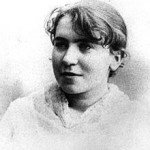 Emma Goldman (1869-1940) was a Russian-American writer, activist and socialist. Born to a working class Jewish family in Russia, Goldman emigrated to the United States as a teenager. She worked briefly as a seamstress before moving to New York and becoming drawn into anarchist politics and journalism. Goldman was regularly in trouble with the law. In 1892 she was involved in a plot to assassinate Henry Clay Frick, a steel company manager who had used violence against striking workers. She was later jailed for inciting criminal activity and violence. Goldman also campaigned for women’s suffrage and birth control. From late 1914 she became America’s most outspoken female anti-war campaigner, writing essays condemning the war and organising protests and rallies. Goldman was instrumental in forming the No Conscription League of New York; she also attacked women’s and suffragette groups that abandoned their opposition to the war once America became involved. The government tolerated Goldman’s outspokenness for a time but she was eventually arrested in 1917 and sentenced to two years in prison. On her release Goldman was stripped of her American citizenship and deported to Russia. She remained there until 1921, after which she settled in Britain.
Emma Goldman (1869-1940) was a Russian-American writer, activist and socialist. Born to a working class Jewish family in Russia, Goldman emigrated to the United States as a teenager. She worked briefly as a seamstress before moving to New York and becoming drawn into anarchist politics and journalism. Goldman was regularly in trouble with the law. In 1892 she was involved in a plot to assassinate Henry Clay Frick, a steel company manager who had used violence against striking workers. She was later jailed for inciting criminal activity and violence. Goldman also campaigned for women’s suffrage and birth control. From late 1914 she became America’s most outspoken female anti-war campaigner, writing essays condemning the war and organising protests and rallies. Goldman was instrumental in forming the No Conscription League of New York; she also attacked women’s and suffragette groups that abandoned their opposition to the war once America became involved. The government tolerated Goldman’s outspokenness for a time but she was eventually arrested in 1917 and sentenced to two years in prison. On her release Goldman was stripped of her American citizenship and deported to Russia. She remained there until 1921, after which she settled in Britain.
[/expand]
[expand title=”Zeth Höglund (Sweden)”]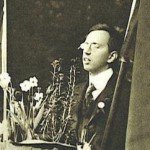 Zeth Höglund (1884-1956) was a Swedish writer, politician, activist and labour leader. Höglund was born and raised in Gothenburg, the son of a storekeeper. As a teenager he became fascinated with left wing political philosophy, an interest he continued during his humanities studies at Gothenburg University. In 1903 Höglund moved to Paris, then considered the heart of European socialism, before returning to Sweden to lead the youth wing of the Social Democratic Party. Höglund became a critic of militarism, co-authoring The Fortress Poorhouse (1913) which likened Sweden to a heavily fortified castle where those inside were destitute. The following year Höglund won a seat in the Swedish legislature, where he delivered agitated speeches against war, militarism and the ruling classes. Sweden maintained a fragile neutrality during World War I – however this did not silence Höglund, who continued to speak against the war and organise anti-war rallies. In 1916 Höglund wrote Peace at any price, an essay urging popular revolution if the government declared war. Though Sweden was not itself at war, Höglund was arrested for sedition and given a year in prison. When released from prison in May 1917 Höglund addressed thousands of his supporters in Stockholm. He later aligned with Lenin and the Bolsheviks and spent some time observing the Russian Revolution.
Zeth Höglund (1884-1956) was a Swedish writer, politician, activist and labour leader. Höglund was born and raised in Gothenburg, the son of a storekeeper. As a teenager he became fascinated with left wing political philosophy, an interest he continued during his humanities studies at Gothenburg University. In 1903 Höglund moved to Paris, then considered the heart of European socialism, before returning to Sweden to lead the youth wing of the Social Democratic Party. Höglund became a critic of militarism, co-authoring The Fortress Poorhouse (1913) which likened Sweden to a heavily fortified castle where those inside were destitute. The following year Höglund won a seat in the Swedish legislature, where he delivered agitated speeches against war, militarism and the ruling classes. Sweden maintained a fragile neutrality during World War I – however this did not silence Höglund, who continued to speak against the war and organise anti-war rallies. In 1916 Höglund wrote Peace at any price, an essay urging popular revolution if the government declared war. Though Sweden was not itself at war, Höglund was arrested for sedition and given a year in prison. When released from prison in May 1917 Höglund addressed thousands of his supporters in Stockholm. He later aligned with Lenin and the Bolsheviks and spent some time observing the Russian Revolution.
[/expand]
[expand title=”Jean Jaurès (France)”]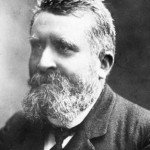 Jean Jaurès (1859-1914) was a French socialist writer and political leader. Born to a lower middle class family in southern France, Jaurès studied philosophy, spent some time in academia then entered local politics in Toulouse. Initially a moderate liberal, Jaurès’ political views were radicalised by his work with striking miners. He entered national politics as a socialist in 1895. In 1902 Jaurès became a founding member and inaugural leader of the French Socialist Party, formed from a coalition of left wing political groups. Though he never held any significant office, Jaurès was a respected and visible politician, known for his measured intelligence and polished oratory. Well aware that a European war was imminent, Jaurès campaigned against militarism and the arms build up, opposed the extension of French military service and called for reconciliation and understanding between Paris and Berlin. In 1914 he attempted to short circuit the coming war by inciting general strikes in both France and Germany, a move that failed. On July 31st, four days before the declaration of war, Jaurès was gunned down in a Paris cafe. His assassin was a young student who wanted war and considered Jaurès to be an agent for peace.
Jean Jaurès (1859-1914) was a French socialist writer and political leader. Born to a lower middle class family in southern France, Jaurès studied philosophy, spent some time in academia then entered local politics in Toulouse. Initially a moderate liberal, Jaurès’ political views were radicalised by his work with striking miners. He entered national politics as a socialist in 1895. In 1902 Jaurès became a founding member and inaugural leader of the French Socialist Party, formed from a coalition of left wing political groups. Though he never held any significant office, Jaurès was a respected and visible politician, known for his measured intelligence and polished oratory. Well aware that a European war was imminent, Jaurès campaigned against militarism and the arms build up, opposed the extension of French military service and called for reconciliation and understanding between Paris and Berlin. In 1914 he attempted to short circuit the coming war by inciting general strikes in both France and Germany, a move that failed. On July 31st, four days before the declaration of war, Jaurès was gunned down in a Paris cafe. His assassin was a young student who wanted war and considered Jaurès to be an agent for peace.
[/expand]
[expand title=”Helen Keller (USA)”]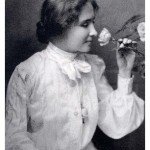 Helen Keller (1880-1968) was a campaigner for the disabled, a radical socialist and an opponent of the war. Born in Alabama, Keller became ill before her second birthday, probably with scarlet fever, and was left permanently blind, deaf and mute. Through the work of a tutor, Anne Sullivan, Keller was taught to communicate and, by adulthood, had become proficient at reading and writing. At age 20 she gained entry to Radcliffe College and became the first blind and deaf person to earn an arts degree. Much of Keller’s life was devoted to socialist activism, philanthropy, pacifism and championing the rights of both women and disabled people. She was a member of the Socialist Party and the IWW, and a supporter of Eugene Debs. When war erupted in 1914 she criticised it as a capitalist money-making venture, writing that the “workers suffer all the miseries [of war] while the rulers reap the rewards”. In 1916 she advocated a general strike, writing: “Strike against war, for without you no battles can be fought. Strike against manufacturing shrapnel and gas bombs and all other tools of murder. Strike against preparedness that means death and misery to millions of human beings.” Keller’s physical condition and public profile prevented American authorities from taking any punitive action against her, as they did against Debs and Emma Goldman.
Helen Keller (1880-1968) was a campaigner for the disabled, a radical socialist and an opponent of the war. Born in Alabama, Keller became ill before her second birthday, probably with scarlet fever, and was left permanently blind, deaf and mute. Through the work of a tutor, Anne Sullivan, Keller was taught to communicate and, by adulthood, had become proficient at reading and writing. At age 20 she gained entry to Radcliffe College and became the first blind and deaf person to earn an arts degree. Much of Keller’s life was devoted to socialist activism, philanthropy, pacifism and championing the rights of both women and disabled people. She was a member of the Socialist Party and the IWW, and a supporter of Eugene Debs. When war erupted in 1914 she criticised it as a capitalist money-making venture, writing that the “workers suffer all the miseries [of war] while the rulers reap the rewards”. In 1916 she advocated a general strike, writing: “Strike against war, for without you no battles can be fought. Strike against manufacturing shrapnel and gas bombs and all other tools of murder. Strike against preparedness that means death and misery to millions of human beings.” Keller’s physical condition and public profile prevented American authorities from taking any punitive action against her, as they did against Debs and Emma Goldman.
[/expand]
[expand title=”Lord Lansdowne (Britain)”]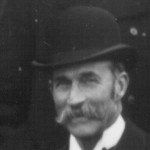 The Marquess of Lansdowne (1845-1927) was an Anglo-Irish peer, British politician and former governor general of Canada. Born Henry Petty-Fitzmaurice in London, he became the Marquess of Lansdowne at age 21, following the death of his father. He became a career politician, holding several significant cabinet positions, before accepting vice-regal appointments in Canada and India. Returning to England in 1894, Lansdowne served as Secretary of State for War (1895-1900) and Foreign Minister (1900-05). He was a member of prime minister Asquith’s war council until 1916. In November 1916 Lansdowne drafted a letter to cabinet, calling for peace negotiations with Germany and a return to the status quo before the war. “We are not going to lose this war”, Lansdowne wrote, “but its prolongation will spell ruin for the civilised world, and an infinite addition to the load of human suffering which already weighs upon it. Security will be invaluable… but what will be the value of the blessings of peace to nations so exhausted that they can scarcely stretch out a hand with which to grasp them?” The letter was rejected by cabinet and Lansdowne tried getting it published in the press, without luck. It was eventually published in the Daily Telegraph in late 1917 and unleashed a flood of reaction, almost all of it dismissive or hostile to Lansdowne. Some went as far as accusing him of being a German spy, or at least having German sympathies.
The Marquess of Lansdowne (1845-1927) was an Anglo-Irish peer, British politician and former governor general of Canada. Born Henry Petty-Fitzmaurice in London, he became the Marquess of Lansdowne at age 21, following the death of his father. He became a career politician, holding several significant cabinet positions, before accepting vice-regal appointments in Canada and India. Returning to England in 1894, Lansdowne served as Secretary of State for War (1895-1900) and Foreign Minister (1900-05). He was a member of prime minister Asquith’s war council until 1916. In November 1916 Lansdowne drafted a letter to cabinet, calling for peace negotiations with Germany and a return to the status quo before the war. “We are not going to lose this war”, Lansdowne wrote, “but its prolongation will spell ruin for the civilised world, and an infinite addition to the load of human suffering which already weighs upon it. Security will be invaluable… but what will be the value of the blessings of peace to nations so exhausted that they can scarcely stretch out a hand with which to grasp them?” The letter was rejected by cabinet and Lansdowne tried getting it published in the press, without luck. It was eventually published in the Daily Telegraph in late 1917 and unleashed a flood of reaction, almost all of it dismissive or hostile to Lansdowne. Some went as far as accusing him of being a German spy, or at least having German sympathies.
[/expand]
[expand title=”Vladimir Lenin (Russia)”]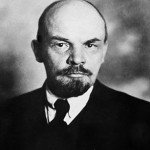 Vladimir Lenin (1870-1924) was a Russian lawyer, political philosopher, revolutionary and political leader. Born in Simbirsk, the son of a school inspector, Lenin’s political views were undoubtedly shaped by execution of his older brother, who was accused of plotting to assassinate the Russian tsar. Lenin became a follower of Marxism, a prolific writer and the most radical of Russia’s socialists. In his essays Lenin predicted a financially-driven European war, long before it began. In Lenin’s view, imperialism and imperialist wars were the logical end products of capitalism, as industrialised capitalist societies struggled for resources and economic control. From the outset of the Great War, Lenin and his followers, dubbed the Bolsheviks, maintained a strong anti-war position. They called for war against the upper classes instead of war between the working masses. Lenin’s strong and consistent anti-war position saw his grow rapidly in 1916-17. Lenin and the Bolsheviks seized control of Russia in October 1917, overthrowing the tsar and promising to build a socialist state. Russia would remain under Soviet control for the next seven decades.
Vladimir Lenin (1870-1924) was a Russian lawyer, political philosopher, revolutionary and political leader. Born in Simbirsk, the son of a school inspector, Lenin’s political views were undoubtedly shaped by execution of his older brother, who was accused of plotting to assassinate the Russian tsar. Lenin became a follower of Marxism, a prolific writer and the most radical of Russia’s socialists. In his essays Lenin predicted a financially-driven European war, long before it began. In Lenin’s view, imperialism and imperialist wars were the logical end products of capitalism, as industrialised capitalist societies struggled for resources and economic control. From the outset of the Great War, Lenin and his followers, dubbed the Bolsheviks, maintained a strong anti-war position. They called for war against the upper classes instead of war between the working masses. Lenin’s strong and consistent anti-war position saw his grow rapidly in 1916-17. Lenin and the Bolsheviks seized control of Russia in October 1917, overthrowing the tsar and promising to build a socialist state. Russia would remain under Soviet control for the next seven decades.
[/expand]
[expand title=”Karl Liebknecht (Germany)”]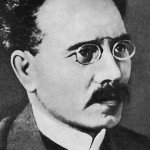 Karl Liebknecht (1871-1919) was a German writer, socialist and revolutionary. Liebknecht came from a politically active middle class family in Leipzig. After studying law and serving briefly in the military Liebknecht set up private practice in Berlin, where he represented socialists charged with political offences. Liebknecht himself joined Social Democratic Party (SDP) and became an influential member of the party’s left wing. In 1907 he published Militarism and Anti-Militarism, which argued that militarism was a cynical device of the elites, used to control the working classes and “arm the people against themselves”. The publication of this book led to Liebknecht being arrested and imprisoned for 18 months. In 1912 Liebknecht was elected to the national Reichstag, where he continued his vocal opposition to the arms build up and, from August 1914, spending on the war effort. Liebknecht’s opposition to the war triggered a split in the SDP and led to his arrest and forced military service on the Eastern Front. He returned to Germany in late 1915 and continued to organise anti-war protests, prompting the German government to imprison him for the duration of the war. Liebknecht was released in the last days of the war and went on to lead the ill fated German Revolution of January 1919. He was captured by government troops, tortured and shot in the back.
Karl Liebknecht (1871-1919) was a German writer, socialist and revolutionary. Liebknecht came from a politically active middle class family in Leipzig. After studying law and serving briefly in the military Liebknecht set up private practice in Berlin, where he represented socialists charged with political offences. Liebknecht himself joined Social Democratic Party (SDP) and became an influential member of the party’s left wing. In 1907 he published Militarism and Anti-Militarism, which argued that militarism was a cynical device of the elites, used to control the working classes and “arm the people against themselves”. The publication of this book led to Liebknecht being arrested and imprisoned for 18 months. In 1912 Liebknecht was elected to the national Reichstag, where he continued his vocal opposition to the arms build up and, from August 1914, spending on the war effort. Liebknecht’s opposition to the war triggered a split in the SDP and led to his arrest and forced military service on the Eastern Front. He returned to Germany in late 1915 and continued to organise anti-war protests, prompting the German government to imprison him for the duration of the war. Liebknecht was released in the last days of the war and went on to lead the ill fated German Revolution of January 1919. He was captured by government troops, tortured and shot in the back.
[/expand]
[expand title=”Ramsay MacDonald”]
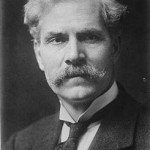 Ramsay MacDonald (1866-1937) was a British socialist, politician and prime minister. The illegitimate son of a Scottish farmer and a servant, MacDonald attended school until the age of 15 then became a trainee teacher. Four years later he left for London, where he attended night school and took an interest in politics, joining the Fabian Society. He joined the socialist Independent Labour Party (ILP) in 1904; the ILP was absorbed by the Labour Party but MacDonald remained a member of both. McDonald was elected to parliament in 1906 and became leader of the Labour Party in 1911. Under his leadership the party had a firm anti-war position; MacDonald himself was strongly opposed to war, having visited South Africa and seeing first hand the consequences of the Boer War. The outbreak of war in August 1914, however, prompted many Labour Party MPs to back the government and the war effort. MacDonald held firm and refused to support war appropriations, resigning the party leadership on August 5th. This made him a target for the patriotic press, which condemned MacDonald as a traitor, engaged in scurrilous personal attacks and called for him to be expelled from parliament. He remained an MP for the duration of the war, even making a visit to Allied troops on the Western Front. MacDonald later returned to the party leadership and served two terms as Britain’s first Labour prime minister.
Ramsay MacDonald (1866-1937) was a British socialist, politician and prime minister. The illegitimate son of a Scottish farmer and a servant, MacDonald attended school until the age of 15 then became a trainee teacher. Four years later he left for London, where he attended night school and took an interest in politics, joining the Fabian Society. He joined the socialist Independent Labour Party (ILP) in 1904; the ILP was absorbed by the Labour Party but MacDonald remained a member of both. McDonald was elected to parliament in 1906 and became leader of the Labour Party in 1911. Under his leadership the party had a firm anti-war position; MacDonald himself was strongly opposed to war, having visited South Africa and seeing first hand the consequences of the Boer War. The outbreak of war in August 1914, however, prompted many Labour Party MPs to back the government and the war effort. MacDonald held firm and refused to support war appropriations, resigning the party leadership on August 5th. This made him a target for the patriotic press, which condemned MacDonald as a traitor, engaged in scurrilous personal attacks and called for him to be expelled from parliament. He remained an MP for the duration of the war, even making a visit to Allied troops on the Western Front. MacDonald later returned to the party leadership and served two terms as Britain’s first Labour prime minister.
[/expand]
[expand title=”Daniel Mannix (Australia)”]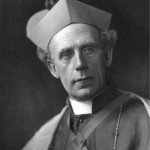 Daniel Mannix (1864-1963) was an Irish-Australian Catholic clergyman and anti-conscription campaigner. Mannix was born to an affluent farming family in County Cork, Ireland. He was ordained into the priesthood in 1890 before undertaking further studies in divinity and theology. In 1912 Mannix was posted to the bishopric of Melbourne, an Australian city with a large population of Irish immigrants. When war broke out in 1914 he was ambivalent at first – however as the conflict dragged on and began to open up sectarian wounds between Australian Catholics and Protestants, Mannix began to speak out. He was particularly vehement in his defence of Irish Catholics, who many accused of shirking enlistment and not doing their ‘fair share’. Mannix spoke against the Hughes government’s attempt to introduce conscription in 1916, urging his followers to reject it. He campaigned more actively during the second conscription plebiscite in 1917, by which time Mannix had been appointed Archbishop of Melbourne. In November 1917 he addressed a rally of around 100,000 people in Richmond, urging them to vote ‘no’ to conscription. He also condemned the conflict in Europe as “a sordid little trade war”. Both conscription plebiscites were defeated, in part because of Mannix’s outspokenness and influence with working class Irish-Australians.
Daniel Mannix (1864-1963) was an Irish-Australian Catholic clergyman and anti-conscription campaigner. Mannix was born to an affluent farming family in County Cork, Ireland. He was ordained into the priesthood in 1890 before undertaking further studies in divinity and theology. In 1912 Mannix was posted to the bishopric of Melbourne, an Australian city with a large population of Irish immigrants. When war broke out in 1914 he was ambivalent at first – however as the conflict dragged on and began to open up sectarian wounds between Australian Catholics and Protestants, Mannix began to speak out. He was particularly vehement in his defence of Irish Catholics, who many accused of shirking enlistment and not doing their ‘fair share’. Mannix spoke against the Hughes government’s attempt to introduce conscription in 1916, urging his followers to reject it. He campaigned more actively during the second conscription plebiscite in 1917, by which time Mannix had been appointed Archbishop of Melbourne. In November 1917 he addressed a rally of around 100,000 people in Richmond, urging them to vote ‘no’ to conscription. He also condemned the conflict in Europe as “a sordid little trade war”. Both conscription plebiscites were defeated, in part because of Mannix’s outspokenness and influence with working class Irish-Australians.
[/expand]
[expand title=”Bertrand Russell (Britain)”]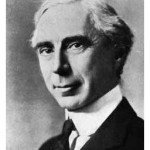 Bertrand Russell (1872-1970) was a British writer, philosopher and mathematician. Russell was born in Wales; his father was a liberal aristocrat, his mother a campaigner for female suffrage. The young Russell was educated by tutors before going on to study at Cambridge. He began writing on mathematics and philosophy and accepted an academic post back at Cambridge. By the turn of the century Russell had become a prominent figure in philosophical circles, despite his youth. Liberal and pacifist by nature, he opposed the war in Europe from the outset. He considered most war to be a product of militarism, which was itself driven by economic interests. Russell also condemned the war as a threat to individual rights and freedoms; for this reason he was outspoken in his defence of conscientious objectors. In 1916 Russell was arrested and fined under the Defence of the Realm Act, for publishing “statements likely to prejudice the recruiting and discipline of His Majesty’s Forces”; this conviction also led to his dismissal from the academic staff at Cambridge. Russell was not silenced and continued to write and speak at anti-war events. In 1918 he was arrested and charged again, for speaking against American involvement in the war. This time Russell was imprisoned in Brixton for six months.
Bertrand Russell (1872-1970) was a British writer, philosopher and mathematician. Russell was born in Wales; his father was a liberal aristocrat, his mother a campaigner for female suffrage. The young Russell was educated by tutors before going on to study at Cambridge. He began writing on mathematics and philosophy and accepted an academic post back at Cambridge. By the turn of the century Russell had become a prominent figure in philosophical circles, despite his youth. Liberal and pacifist by nature, he opposed the war in Europe from the outset. He considered most war to be a product of militarism, which was itself driven by economic interests. Russell also condemned the war as a threat to individual rights and freedoms; for this reason he was outspoken in his defence of conscientious objectors. In 1916 Russell was arrested and fined under the Defence of the Realm Act, for publishing “statements likely to prejudice the recruiting and discipline of His Majesty’s Forces”; this conviction also led to his dismissal from the academic staff at Cambridge. Russell was not silenced and continued to write and speak at anti-war events. In 1918 he was arrested and charged again, for speaking against American involvement in the war. This time Russell was imprisoned in Brixton for six months.
[/expand]
[expand title=”George Bernard Shaw (Britain)”]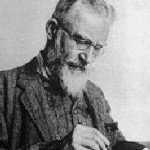 George Bernard Shaw (1856-1950) was an Irish-born British writer and playwright, arguably Britain’s greatest dramatist of the 20th century. Born in Dublin to an English Protestant family, Shaw left school at 15 and worked briefly as a clerk before moving to London. He turned his hand to writing but with opportunities scarce, Shaw spent most of his time reading and studying in libraries. During this period he acquired socialist political views and become a member of the Fabian Society, the forerunner to the British Labour Party. Shaw eventually became a successful writer of novels, short stories, essays, literary criticism and, most notably, dramatic works. Shaw’s plays – such as Pygmalion, the basis for My Fair Lady – were performed across Britain and proved enormously popular. Many of his creations touched on important social, political or reformist issues. Shaw was a pacifist at heart and the outbreak of World War I prompted him to speak out. He wrote several letters and articles for the press in 1914, comparing England and Germany to “a couple of extremely quarrelsome dogs”. In November Shaw published an essay titled Common Sense about the War that suggested English militarism was almost as much to blame for the conflict as the German variety. This piece earned Shaw condemnation and scorn in the pro-war press, while many began to boycott his plays. Despite this, Shaw continued to write critical pieces on the war, even visiting the Western Front in 1917.
George Bernard Shaw (1856-1950) was an Irish-born British writer and playwright, arguably Britain’s greatest dramatist of the 20th century. Born in Dublin to an English Protestant family, Shaw left school at 15 and worked briefly as a clerk before moving to London. He turned his hand to writing but with opportunities scarce, Shaw spent most of his time reading and studying in libraries. During this period he acquired socialist political views and become a member of the Fabian Society, the forerunner to the British Labour Party. Shaw eventually became a successful writer of novels, short stories, essays, literary criticism and, most notably, dramatic works. Shaw’s plays – such as Pygmalion, the basis for My Fair Lady – were performed across Britain and proved enormously popular. Many of his creations touched on important social, political or reformist issues. Shaw was a pacifist at heart and the outbreak of World War I prompted him to speak out. He wrote several letters and articles for the press in 1914, comparing England and Germany to “a couple of extremely quarrelsome dogs”. In November Shaw published an essay titled Common Sense about the War that suggested English militarism was almost as much to blame for the conflict as the German variety. This piece earned Shaw condemnation and scorn in the pro-war press, while many began to boycott his plays. Despite this, Shaw continued to write critical pieces on the war, even visiting the Western Front in 1917.
[/expand]
© Alpha History 2014. Content on this page may not be republished or distributed without permission. For more information please refer to our Terms of Use.
This page was written by Jennifer Llewellyn, Jim Southey and Steve Thompson. To reference this page, use the following citation:
J. Llewellyn et al, “Anti-war figures” at Alpha History, https://alphahistory.com/worldwar1/anti-war-figures/, 2014, accessed [date of last access].
